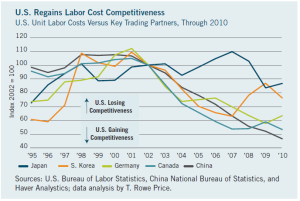Looking at the effects of Cyprus echoing around the financial markets, one thing that’s become apparent is that it really isn’t all about the U.S. any more. Even as the U.S. economy continues to recover, the international press doesn’t care that much. We are a much smaller piece of a much bigger pie. Still the largest piece, still important, but not what we were.
Some of the perennial questions I get from clients arise from our diminished place in the scheme of things. What happens, for example, if the dollar collapses? Given the central role the U.S. occupies in the world financial system, the standing answer has been that it won’t happen any time soon. World trade is denominated in dollars, the world’s low-risk reserve currency. Under current conditions, there is no alternative.





